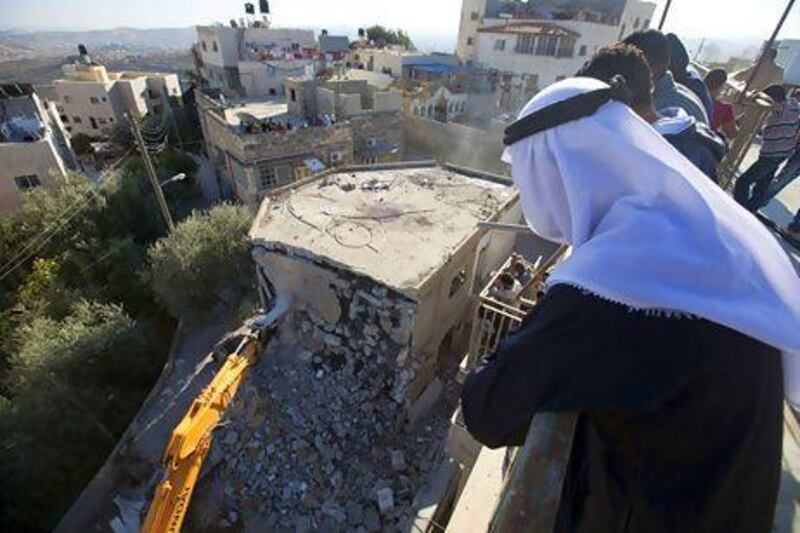New York // After the Palestinians secured their victory at the United Nations, Hillary Clinton, the US secretary of state, said "we have Israel's back".
Mrs Clinton remarks at an Israeli-US forum drew a loud applause from former and current Israeli political leaders in attendance, including the far-right foreign minister, Avigdor Lieberman. The friendly atmosphere, however, belied deep frustration in the Obama administration over the Israeli response to the UN vote.
Israel had just announced it had authorised new settlements in a sensitive area east of Jerusalem, in an area of land known as the E1, that would divide the West Bank in two, making a contiguous Palestine an impossibility.
Her speech at the Brookings Institution's Saban Center for Middle East policy in Washington, DC, on Friday came a day after the UN General Assembly voted overwhelmingly in favour of granting Palestine non-member observer state status. The United States and Israel were among the nine nations that voted against the resolution.
"E1 will signal the end of the two-state solution," an Israeli settlements expert Daniel Seidemann told Reuters on Friday.
In a press briefing on Friday, US state department spokeswoman, Victoria Nuland dodged questions regarding what repercussions of such a development but did describe the move as "counterproductive".
The E1 announcement caught the US by surprise, coming as it did after Israeli officials had sought to down play the UN vote.
But by swiftly bringing E1 in to play, the Israelis signalled that they were willing to engage in a diplomatic war over the future of the West Bank and East Jerusalem - and risk increasing global isolation, even in Europe. Pro-settler hardliners in the administration of prime minister Benjamin Netanyahu appear to have won the debate over how to respond to the UN vote.
The hardliners may have prevailed because of the one significant non-symbolic power the new status gives the Palestinian Authority (PA): the ability to bring war crimes cases to the International Criminal Court (ICC).
"Israelis are afraid of being hauled to The Hague," the Middle East programme director for the International Crisis Group, Robert Malley, told Reuters.
The PA has not said when or if it might use this new power, but any decision will have to be balanced by the E1 threat as well as overwhelming anger in the US Congress, which the PA president, Mahmoud Abbas, depends on for aid to help a weak West Bank economy.
US legislators added to a bill due for a vote in the Senate this week as much as US$935 million (Dh3.43bn) in aid cuts to the PA if they use their new status to challenge Israel at the ICC. The bill, which was drafted before Thursday, would also cut aid by 20 per cent to any country that voted to upgrade Palestinian status in the UN.
The Israeli move on E1, seen by some as a bluff, is also perhaps their own piece of symbolic theatre before it holds general elections in January.
Mr Netanyahu leads a coalition of right-wing parties expected to win on the back of a rightward shift in Israeli public opinion and growing lack of support for a two-state solution. The E1 announcement could bring them electoral dividends.
Meanwhile, Hamas continues to benefit from Israel's uncompromising stands and the PA's perceived inability to extract concessions. Yesterday, media reports claimed its Doha-based leader, Khaled Mashaal, would this week visit the Gaza Strip for the first time to celebrate Hamas's 25th anniversary and congratulate fighters who battled Israel during its recent air assault on the territory.
tkhan@thenational.ae
* With additional reporting by Reuters and Associated Press





